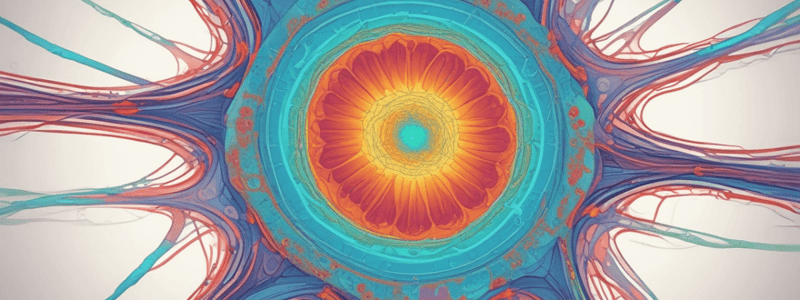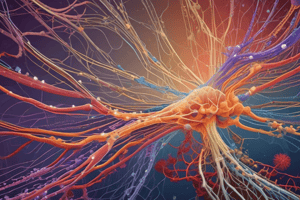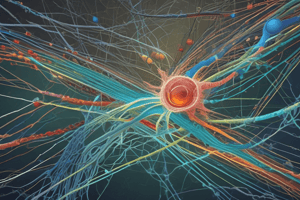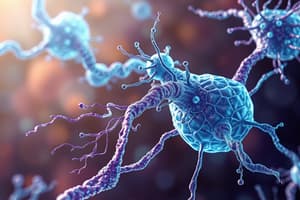Podcast
Questions and Answers
What is the approximate diameter of actin microfilaments?
What is the approximate diameter of actin microfilaments?
- 15-17 nm
- 7-9 nm (correct)
- 10-12 nm
- 5-7 nm
What is the process involved in the polymerization of G-actin to microfilament (F-actin)?
What is the process involved in the polymerization of G-actin to microfilament (F-actin)?
- ATP hydrolysis (correct)
- GTP hydrolysis
- ATP synthesis
- Phosphorylation
What is the orientation of monomers in the head-to-tail arrangement during actin microfilament formation?
What is the orientation of monomers in the head-to-tail arrangement during actin microfilament formation?
- Head-to-tail (correct)
- Head-to-head
- Side-by-side
- Tail-to-tail
What percentage of cellular protein is composed of actin microfilaments?
What percentage of cellular protein is composed of actin microfilaments?
What is the function of actin microfilaments in muscle contraction?
What is the function of actin microfilaments in muscle contraction?
What is the role of intermediate filaments in the cytoskeleton?
What is the role of intermediate filaments in the cytoskeleton?
What is the diameter of microtubules?
What is the diameter of microtubules?
What is the function of cytoskeleton in cell structure?
What is the function of cytoskeleton in cell structure?
What is the fundamental unit of an intermediate filament?
What is the fundamental unit of an intermediate filament?
What is a characteristic of subunit exchange in intermediate filaments?
What is a characteristic of subunit exchange in intermediate filaments?
Which protein is involved in linking intermediate filaments to actin microfilaments and microtubules?
Which protein is involved in linking intermediate filaments to actin microfilaments and microtubules?
What is a disease caused by mutations in neurofilamins?
What is a disease caused by mutations in neurofilamins?
What is a characteristic of microtubules?
What is a characteristic of microtubules?
What is the term for the ends of a protofilament?
What is the term for the ends of a protofilament?
What is the function of thymosin β4 in actin binding proteins?
What is the function of thymosin β4 in actin binding proteins?
Which protein is responsible for creating a mesh in actin microfilaments?
Which protein is responsible for creating a mesh in actin microfilaments?
What is the result of gelsolin cutting and binding to the (+) end of actin microfilaments?
What is the result of gelsolin cutting and binding to the (+) end of actin microfilaments?
What is the function of myosin in non-muscle cells?
What is the function of myosin in non-muscle cells?
What is the function of lamellipodia in cell movement?
What is the function of lamellipodia in cell movement?
What is the function of intermediate filaments in epithelial cells?
What is the function of intermediate filaments in epithelial cells?
What is unique about lamins compared to other intermediate filaments?
What is unique about lamins compared to other intermediate filaments?
What is the diameter of intermediate filaments?
What is the diameter of intermediate filaments?
What is the underlying cause of situs inversus?
What is the underlying cause of situs inversus?
Which of the following is a consequence of disrupted microtubule formation?
Which of the following is a consequence of disrupted microtubule formation?
What is the role of actin microfilaments in cell-cell adhesion?
What is the role of actin microfilaments in cell-cell adhesion?
Which anti-cancer chemotherapeutic agent stabilizes microtubules?
Which anti-cancer chemotherapeutic agent stabilizes microtubules?
What is the consequence of mutated proteins associated with primary cilia function?
What is the consequence of mutated proteins associated with primary cilia function?
What is the role of cytoskeleton in cell-cell adherence?
What is the role of cytoskeleton in cell-cell adherence?
What is the primary function of the Microtubule-Organising Centre (MTOC) in a cell?
What is the primary function of the Microtubule-Organising Centre (MTOC) in a cell?
Which of the following motor proteins is responsible for moving cargo towards the cell periphery?
Which of the following motor proteins is responsible for moving cargo towards the cell periphery?
What is the function of the centrioles in the centrosome?
What is the function of the centrioles in the centrosome?
What is the primary function of microtubules in the structure of cilia?
What is the primary function of microtubules in the structure of cilia?
What is the function of the kinetochore microtubules in the spindle?
What is the function of the kinetochore microtubules in the spindle?
What is the rate of movement of vesicles along microtubules in axons?
What is the rate of movement of vesicles along microtubules in axons?
What is the function of the Basal Body in cilia?
What is the function of the Basal Body in cilia?
What is the function of actin filaments in stereocilia?
What is the function of actin filaments in stereocilia?
Study Notes
Cytoskeleton
- Network of protein filaments with various functions:
- Connection with Extracellular Matrix (ECM)
- Maintaining cell shape
- Intracellular transport
- Cytokinesis
- Chromosome separation
- Cell movement
Composition of Cytoskeleton
- Actin microfilaments:
- Polymers of actin, 7-9 nm diameter
- Intermediate filaments:
- Tissue-specific proteins, 10 nm diameter
- Microtubules:
- Polymers of tubulin, 25 nm diameter
Actin Microfilaments
- Monomer is globular protein (G-actin) containing ATP-binding domain
- G-actin polymerises to microfilament (F-actin), process involves ATP hydrolysis
- Polymerisation via non-covalent interactions, monomers in Head to Tail orientation, each microfilament has a (+) and (-) end
- Dynamic structure: length depends on relative rate of loss and gain of G-actin monomers
- Actin microfilaments are usually present as two tightly wound chains
- Comprises ~5% of cellular protein
Function of Actin
- Muscle contraction
- Mechanical support (e.g., in microvilli)
- Maintaining cell shape
- Cell movement
Actin Binding Proteins
- G-actin binding proteins (e.g., thymosin β4: inhibits polymerisation)
- Cross-linking proteins (e.g., villin: parallel bundles in microvilli, filamin: joining at angles to create a mesh)
- Severing proteins (e.g., gelsolin: cuts and binds (+) end; the other part depolymerises – “gel to sol”)
Contraction in Non-Muscle Cells
- Muscle myosin is also present in non-muscle cells
- Interaction between myosin and actin microfilaments allows movement, requires ATP hydrolysis
- Movement within cells (e.g., cytokinesis, lamellipodia-mediated cell movement)
Intermediate Filaments (IF)
- Polymers of individual IF proteins, 10 nm in diameter
- Different IF proteins in different cell types (e.g., epithelial cells: keratin(s), axons: neurofilamin(s), universal (nuclear): lamins A, B, C)
- Usually stable and not dynamic (exception: lamins are dynamic during mitosis)
- Formation of IF polymer involves helical dimer, tetramer, and staggered formation of protofilaments
- Interaction between IFs and cytoskeleton (e.g., plectin links actin microfilaments and microtubules)
Microtubules
- Protofilament has a (-) and (+) end
- Monomers can be added and removed from both (+) and (-) ends
- 13 parallel protofilaments arranged in a hollow tube, microtubules approx. 25 nm diameter
- Microtubule-Organising Centre (MTOC): usually has one end attached to MTOC, microtubules “grow out” from MTOC until reach destination and then are stabilised
- Assembly and disassembly of microtubule: GTP bound monomers assemble onto filament, GDP bound monomers dissociate rapidly
Function of Microtubules
- Dynamic scaffold
- Spindle for chromatid separation during mitosis
- Movement of cargo to specific locations in cell
- Central internal support of cilia
- Stabilise structure of cells (e.g., platelets)
- Organise the structure of organelles (e.g., endoplasmic reticulum)
Mitotic Spindle
- Spindle consists of microtubules, initiated from the centrosome (type of Microtubule-Organising Centre)
- Centrosomes contain a pair of centrioles with stable fused microtubules
- Kinetochore microtubules attached to the centromere of chromatid, aster microtubules attach centrosome to cell membrane
Cilia
- Membrane-bound hair-like extensions
- Microtubules are central support
- MTOC is called Basal Body, located close to membrane
- Microtubules facilitate movement of components up and down within cilia
- All cells have single primary cilia, disassembled during mitosis
- Specialised types: stereocilia in the inner ear – sound detection, motile cilia in respiratory/lung ciliated epithelia – beat and move fluid around
Studying That Suits You
Use AI to generate personalized quizzes and flashcards to suit your learning preferences.
Description
This quiz covers the three main components of the cytoskeleton, their assembly and disassembly, and their roles in cell structure and motility. Understand the importance of the cytoskeleton in various cellular processes.



